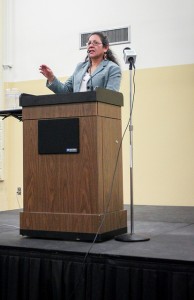
Michaela Gaffke / Winonan
Visual artist, poet and teacher Gabrielle Wynde Tateyuskanskan of the Sisseton Wahpeton Dakota Nation gave a speech titled “Confronting the Conscience of America through the Dakota Arts” in East Hall on Wednesday, Jan. 20. Tateyuskanskan discussed the importance of Native American activists and artists, and their contribution to education of non-native people about their community’s struggles in the past and present.
“There are grave consequences for humans if history is not told,” Tateyuskanskan said.
Tateyuskanskan stressed the importance of not letting colonization fade into history. She talked about how schools teach history in a one-sided way, and how it indoctrinates the stereotypes of Native American people as savages and inhuman to young people, both Native American and non-native.
“Peace is our heritage,” Tateyuskanskan said.
According to Tateyuskanskan, there is a law still in place today which bans Dakota people from Minnesota lands. Even though it is not enforced, this law of segregation has been around since the early 1860s.
“Nobody should be told it happened in the past and to get over it,” Tateyuskanskan said.
Tateyuskanskan said the tragic history of Dakota people should not be covered up, and Americans do not know Native American history.
“The Doctrine of Discovery must be talked about in schools,” she said.
The Doctrine of Discovery took lands away from Native Americans because they were not Christian people, and only Christian people could own land.
According to Tateyuskanskan, public knowledge must happen before change is possible.
Tateyuskanskan said she wishes non-native people would listen to the aspirations of the Dakota communities and acknowledge the injustice they have faced.
“Knowing history allows you to create a better vision for the future,” Tateyuskanskan said.
Tateyuskanskan is working on a project called Mothers Against Injustice. It will aim to educate tribal people on the reality of police brutality and racial profiling they face. It will also strive for advocating the establishment of community trust of Native American people and to bring attention to unfair police practices.
“People must acknowledge injustice and repair it,” Tateyuskanskan said.
Tateyuskanskan’s personal artwork was exhibited in the KEAP Diversity Center, including two traditional Dakota garments, a knife sheath and two watercolor paintings.
A traveling exhibit also came with her, called “Why Treaties Matter,” which features an interactive touch screen and visual images of Native American history. The exhibit was setup in the Student Union from Jan. 11 to Jan. 24.







































